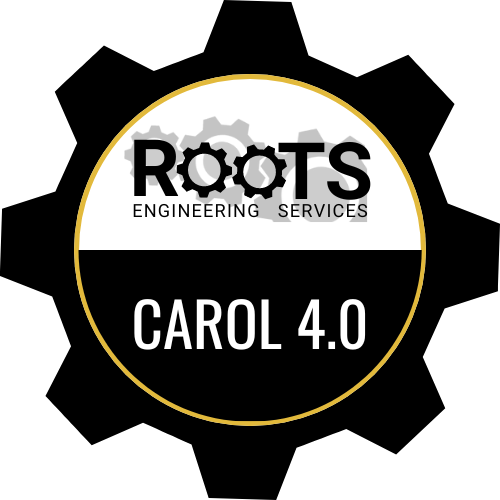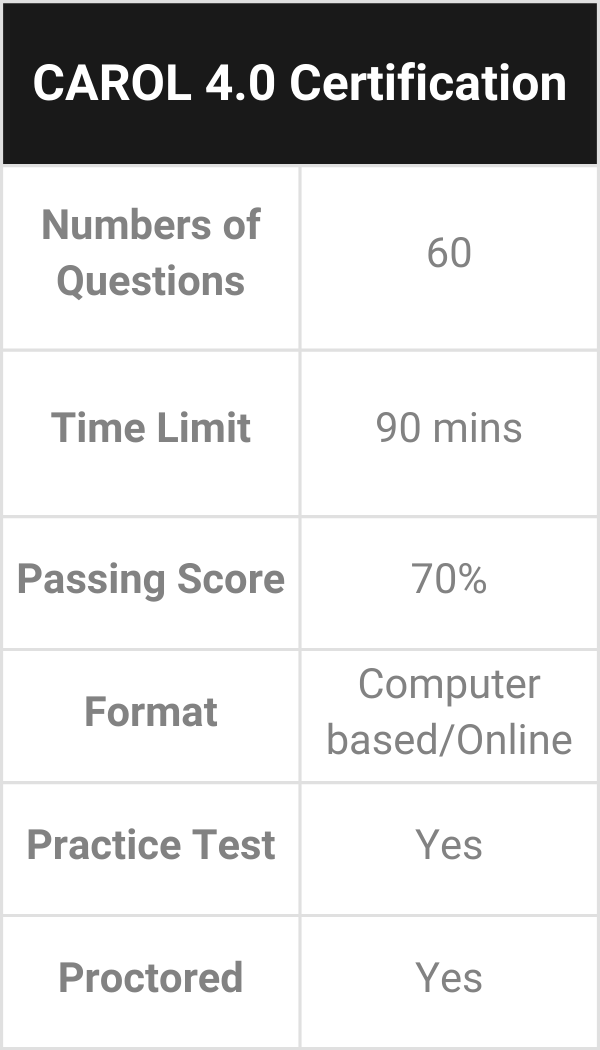Collaborative Action Robotics Occupational Learning (CAROL) 4.0
Certification
The Collaborative Action Robotics Occupational Learning 4.0 Certification equips industry professionals plus secondary and post-secondary students with essential skills in advanced manufacturing, focusing on robotics to meet Industry 4.0 demands. This certification offers a fast track to in-demand expertise, supporting local economies and ensuring industries remain competitive. It is a crucial alternative to traditional degrees, addressing the growing need for a skilled workforce.

What are the benefits of getting certified?
Enhanced Employability: Earning the CAROL 4.0 equips you with industry-relevant skills in robotics and automation, making you a more attractive candidate for employers in the advanced manufacturing sector.
Career Advancement: This certification opens up opportunities for higher-paying jobs and positions with greater responsibility, as it demonstrates your ability to work with cutting-edge technologies that are essential to Industry 4.0.
Immediate Workforce Entry: CAROL 4.0 provides a fast track to entering the workforce, allowing you to bypass lengthy degree programs while still gaining the skills and credentials needed for a successful career in manufacturing and automation.
Industry Recognition: The certification is recognized by employers as a mark of competence and expertise, giving you a competitive edge in the job market.
Foundation for Lifelong Learning: CAROL 4.0 not only prepares you for immediate employment but also lays the groundwork for continued learning and development in the rapidly evolving field of industrial automation.
CAROL 4.0 Certification Objectives:
- Automation & Industry: Understand the history, types, and applications of robotics and automation, including collaborative robots and Industry 4.0 technologies.
- Safety: Demonstrate proper safety procedures for handling robotics equipment, including lab safety, PPE usage, and understanding emergency stop functions.
- Integration Skills: Develop measurement skills, interpret schematics, and understand basic electrical concepts critical to industrial environments.
- Robots & Cobots: Operate, program, and troubleshoot robots and cobots, including using teach pendants and understanding motion types, payloads, and safety systems.
- End Effectors: Install and configure robotic end-of-arm tools (EOATs), adjusting for payload and center of gravity while ensuring proper cable management.
- Troubleshooting: Use root cause analysis techniques to identify and resolve problems in robotic and automation systems.
- Pneumatics & Actuators: Understand, install, and adjust actuators and transducers within automated systems, ensuring proper air and pressure management.
- Sensors: Install and program sensors for industrial applications, ensuring they function correctly within automation processes.
- Conveyors: Understand and integrate conveyors into robotics systems, including sensor and speed control.
- Advanced Robot Programming: Master advanced programming concepts, including variables, subroutines, wait commands, and threads for optimized robotic performance.
Test Security and Irregularities
- The CAROL 4.0 Certification is a closed-book certification with no assistance from proctors or other test candidates.
- Security Measures: All test materials are confidential, and students must follow security policies, such as taking the exam at the scheduled time, not opening materials until instructed, and not removing materials from the room.
- Consequences for Violations: ROOTS Engineering Services will cancel the scores of any student found violating these security measures. Serious breaches, such as unauthorized recording or sharing of test content, may result in a ban from future exams.
Score Invalidation Procedures
- ROOTS Engineering Services will invalidate any scores if a student is found cheating or violating exam security. This includes unauthorized access to exam content, removing materials from the test site, or using prohibited aids.
- ROOTS Engineering Services reserves the right to ban students from future exams if deliberate attempts to cheat or share exam content are discovered. The duration of the ban will depend on the severity of the violation, and ROOTS may share information about banned students with their educational institutions.
Documentation
All interactions, including test scheduling, retest requests, and certification issuance, must be documented and securely stored by ROOTS Engineering Services administrative staff.
Compliance
Adherence to this SOP is mandatory for all parties involved in the CAROL 4.0 certification testing process. Non-compliance could affect the validity of the certification test and result in the non-issuance of a CAROL 4.0 certification.
Procedures
1. Scheduling, Rescheduling, and Test Preparation
1.1 All scheduling and rescheduling requests should be emailed to customer.support@rootsengineering.co.
1.2 A minimum of 72 hours notice is required for scheduling or rescheduling CAROL 4.0 certification tests.
1.3 Schools must inform ROOTS Engineering Services of any absences immediately, allowing 72 hours for exam rescheduling.
1.4 Schools should aim to combine retest events for absentees and students who did not pass the initial test.
1.5 Students are required to sign in and sign out with the proctor at their examination time.
2. Certification Testing and Proctoring
2.1 The proctor will administer the CAROL 4.0 certification test at the scheduled date and time.
2.2 The CAROL 4.0 Certification is a closed-book certification with no assistance allowed from the proctor, other candidates, or any electronic devices.
2.3 Upon completion of the test, students will receive a preliminary score, but official certification status is determined by ROOTS Engineering Services after a full review of the proctored materials.
3. Retesting and Absentee Rescheduling
3.1 Students who fail the certification test may retake the exam up to three times, with a required 20-day waiting period between attempts for secondary students.
3.2 Each retest will provide a new version of the exam to ensure the integrity of the testing process.
3.3 Names of students requiring a retest must be submitted by email to ROOTS Engineering Services immediately to facilitate testing according to the 20-day waiting period.
4. School District/College Test Management
4.1 At the discretion of ROOTS Engineering Services, a school district or college may manage the enabling and disabling of tests within a 3-hour window.
4.2 A proctor must supervise all exams at all times, ensuring students adhere to sign-in/out protocols.
5. Issuance of Official Certification
5.1 ROOTS Engineering Services requires 72 hours to process and issue official certifications to the college/school for students who have passed the CAROL 4.0 certification test.
5.2 An official certification from ROOTS Engineering Services will include a serial number and is the only document that officially certifies a student.
5.3 Certifications will be sent by email to the appropriate school district/college staff for distribution to students.
The technical requirements for accessing the certification website include:
- Supported Browser: Latest versions of Chrome, Firefox, Safari, or Edge.
- Internet Connection: A stable high-speed internet connection (at least 10 Mbps).
- Device: Desktop or laptop computer with at least 4GB RAM and an updated operating system (Windows 10 or macOS 10.12 or higher).
- Screen Resolution: Minimum of 1280×800 pixels.
- JavaScript and Cookies: Must be enabled in your browser settings.
- Pop-up Blockers: Disable any pop-up blockers or ensure the site is whitelisted.
- PDF Reader: Ability to view PDF documents (Adobe Acrobat Reader or similar).
- Multimedia Support: Speakers or headphones for video content and a webcam/microphone if necessary for virtual proctoring.
READY TO take one of our industry certifications?

